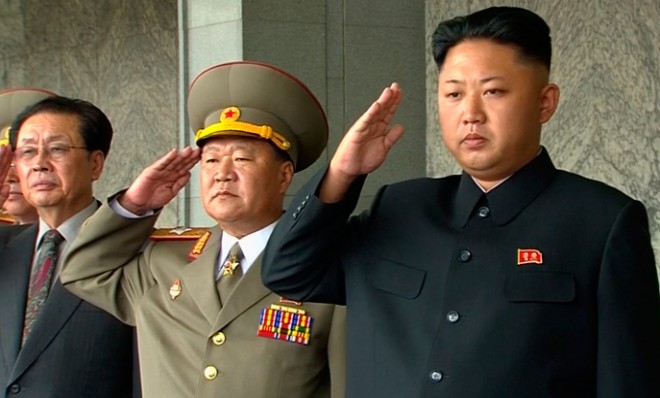Is the Syria debate sending the wrong message to North Korea?
As Obama delays his threat to strike Syria, Kim Jong Un's Hermit Kingdom makes a provocative move


A free daily email with the biggest news stories of the day – and the best features from TheWeek.com
You are now subscribed
Your newsletter sign-up was successful
As the U.S. and Russia haggle over how to seize Syria's chemical weapons, another stubborn disarmament challenge appears to have resurfaced in North Korea.
Satellite images indicate that the Hermit Kingdom is restarting the plutonium reactor at its Yongbyon nuclear facility, potentially escalating tensions over its nuclear program just as they were beginning to ease. The images, reported by the U.S.-Korea Institute at Johns Hopkins University, show two columns of steam rising from the reactor that was disabled under a 2007 aid-for-disarmament pact and considered key to expanding North Korea's tiny nuclear arsenal.
The White House argued for weeks that launching missile strikes against Syria was necessary both to punish the Syrian regime for its alleged use of chemical weapons, and to show other U.S. adversaries, such as Iran and North Korea, that the Obama administration would follow through on its warnings against using weapons of mass destruction. Critics now say that North Korea's provocative move shows how threatening to hit one country to scare another can have dangerous repercussions.
The Week
Escape your echo chamber. Get the facts behind the news, plus analysis from multiple perspectives.

Sign up for The Week's Free Newsletters
From our morning news briefing to a weekly Good News Newsletter, get the best of The Week delivered directly to your inbox.
From our morning news briefing to a weekly Good News Newsletter, get the best of The Week delivered directly to your inbox.
There's one major hole in the argument that the Syria wrangling emboldened North Korea's secretive leaders: Kim Jong Un and Co. have been vowing to fire up the small plutonium reactor for five months. Earlier in the year, North Korea was threatening to rain nukes on South Korea and the U.S. in retaliation for sanctions imposed after its latest missile and nuclear tests, and it announced in April that it would quickly reopen Yongbyon to increase electricity production and expand nuclear program.
Intelligence officials say North Korea has enough plutonium for six to 12 nuclear weapons, and this reactor would produce 13 pounds of plutonium per year, enough for one or two more bombs.
That makes the Yongbyon reactor a linchpin in the impoverished communist nation's time-tested strategy of agreeing to rein in its nuclear program in exchange for the aid it needs to keep its people from starving, then violating the deals later to start the process all over again. Here is how David E. Sanger, William J. Broad, and Choe Sang-hun at The New York Times described the game:
Analysts said the re-emergence of steam at the plant — whether real or a contrivance — could well be designed by the North to try to force the United States and its allies into the talks in the hopes of winning economic aid by creating the fear that North Korea is preparing to add to its weapons stockpile.But the move could have the opposite effect. President Obama has been deeply reluctant to take steps that would reward North Korea for halting activities it had already agreed to stop. His former secretary of defense, Robert M. Gates, once famously said that the United States was "tired of buying the same horse twice." [The New York Times]
Diplomats and analysts note that resuming operations at Yongbyon would violate a host of United Nations resolutions. "Restarting it is another slap in the face to the international community, indicating that North Korea has no intention whatsoever of abandoning its nuclear weapons," James Acton, an analyst for the Nuclear Policy Program at the Carnegie Endowment for International Peace, tells Reuters.
A free daily email with the biggest news stories of the day – and the best features from TheWeek.com
If that is the case, maybe the real tie in to Syria is that even negotiated disarmament deals don't mean much unless there is a built-in way to enforce them.
Harold Maass is a contributing editor at The Week. He has been writing for The Week since the 2001 debut of the U.S. print edition and served as editor of TheWeek.com when it launched in 2008. Harold started his career as a newspaper reporter in South Florida and Haiti. He has previously worked for a variety of news outlets, including The Miami Herald, ABC News and Fox News, and for several years wrote a daily roundup of financial news for The Week and Yahoo Finance.
-
 One great cookbook: Joshua McFadden’s ‘Six Seasons of Pasta’
One great cookbook: Joshua McFadden’s ‘Six Seasons of Pasta’the week recommends The pasta you know and love. But ever so much better.
-
 Scientists are worried about amoebas
Scientists are worried about amoebasUnder the radar Small and very mighty
-
 Buddhist monks’ US walk for peace
Buddhist monks’ US walk for peaceUnder the Radar Crowds have turned out on the roads from California to Washington and ‘millions are finding hope in their journey’
